The Raimondas Savickas Picture Gallery invites you to an evening of poetry and painting at the gallery, located at Basanavičiaus street no. 11 in Vilnius, at 6:00 P.M. on Friday, December 7. Rūta Eidukaitytė will sing and play guitar as well.
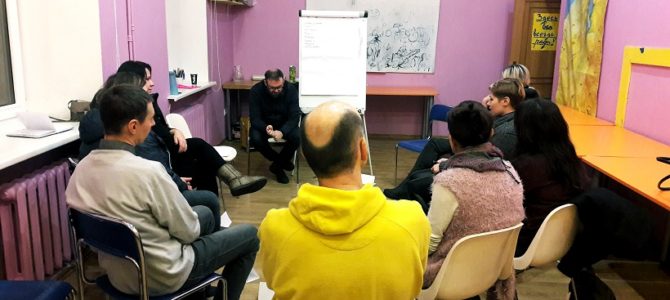
First Meeting of Parenting Skills Program at LJC Social Programs Department
We are happy to announce that on the eve of the Jewish holiday of Hanukkah the first meeting of parents took place in the Parenting Skills Program being conducted by the Social Programs Department of the Lithuanian Jewish Community under the program to support Jewish families. Many of the parents of teenagers following the meeting expressed relief that there is advice available for solving their problems in child-rearing.
The group for practicing parenting skills is based on the ideas of the authors of individual psychology. The founder of individual psychology was Alfred Adler (1870-1937). Parents in the LJC program meet and work in a group, share their experience, check that against theoretical advice for raising children and look for common answers to their problems.
Due to the large interest expressed by parents in the program, next year the LJC Social Programs Department is planning to offer a parenting skills program for parents raising children of different ages.
Happy Hanukkah from the Social Programs Department!

Looking Back at 30 Years of Hanukkah Celebrations
Maša Grodnikienė recalled for us the first Hanukkah celebration by the constituent Lithuanian Jewish Community back in 1988.
Lithuanian Jews who survived World War II celebrated Hanukkah quietly at home. In 1987 the Lithuanian Jewish Cultural Association formed and Emanuelis Zingeris became chairman.
On December 4, 1988, Lithuanian Jews came together and collected funds for a shared Hanukkah celebration. This was a memorable holiday in Vilnius, a big event with a beautiful group of people at the Dainava restaurant. Yiddish was spoken and sung. The cultural events group of the Lithuanian Jewish Cultural Association drafted the program and organized the event. The Fayerlakh Jewish ensemble with directors Griša Kravecas and Ana Kravec performed, as did the ethnographic ensemble conducted by Amos Traub and the Kaunas Jewish stage ensemble. Chaimas Gurvičius directed the concert. About 370 people attended. Chairman of the board of the Lithuanian Cultural Fund Česlovas Kudaba greeted the audience, and deputy chairman Tarvydas also took part. This was a grand Hanukkah evening celebration with a concert and speeches.
Remember what that time was like in Lithuania–the independence movement Sąjūdis had formed and Lithuanian Jews from different cities and towns came together and were part of Sąjūdis. Everyone was exhilarated, excited, happy that finally with the national rebirth of Lithuania the Jews of Lithuania could celebrate together that great holiday of the triumph of the spirit, Hanukkah. The majority sought to attend, there weren’t enough places and it was impossible to get in. At that time there were 17,000 Jews living in Lithuania.
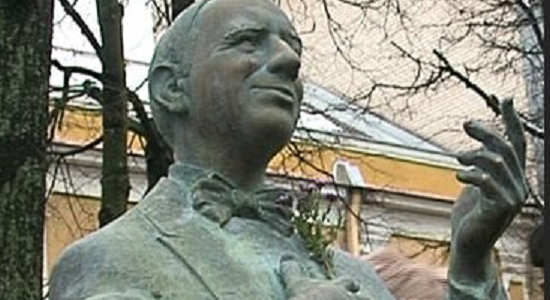
Commemorating the Death of Danielius Dolskis (1891-1931)
The Kaunas Jewish Community will commemorate the anniversary of the death of Danielis Dolskis with a prayer at the Žaliakalnis Jewish cemetery in Kaunas at 5:00 P.M. on December 3, 2018. We invite those who so desire to join in and honor the memory of the founder of popular Lithuanian stage music.
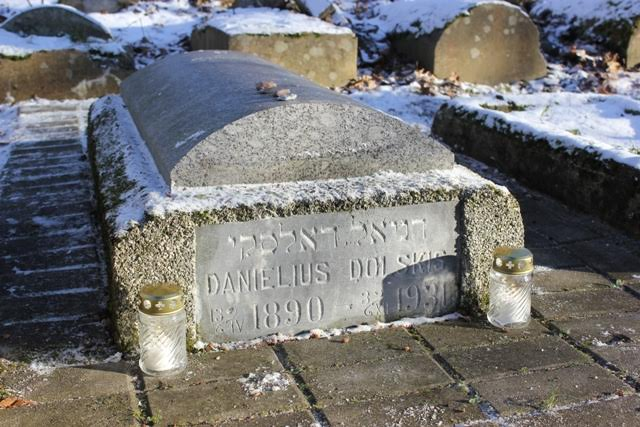
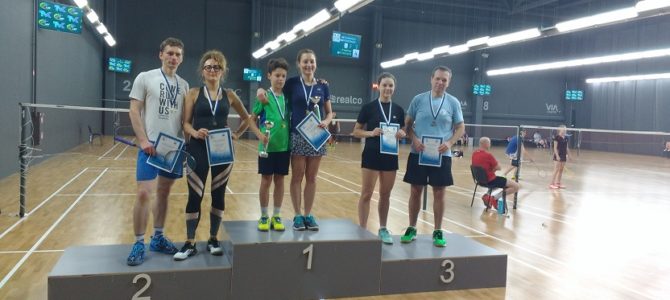
Eleventh Makabi Badminton Grand Prix
The eleventh Makabi Grand Prix badminton championship was held at the Delfi Sport Center in Vilnius November 25 with competitors from 12 badminton clubs in Vilnius, Kaunas, Panevėžys and Prienai for a total of 75 participants.
The athletes competed adult and youth categories. Adults had five subcategories: men’s and women’s singles, doubles and mixed doubles, while the young people competed in four: boys’ and girls’ singles and doubles.
Vitalija Movšovič, from the Lithuanian youth team and the Makabi team, made the best showing, becoming champion in adult women’s singles, and taking second place in women’s doubles. She and her father Igor Movšovič took third place in mixed doubles.
All participants received diplomas, there were three categories of medals and absolute winners in their category received trophies.
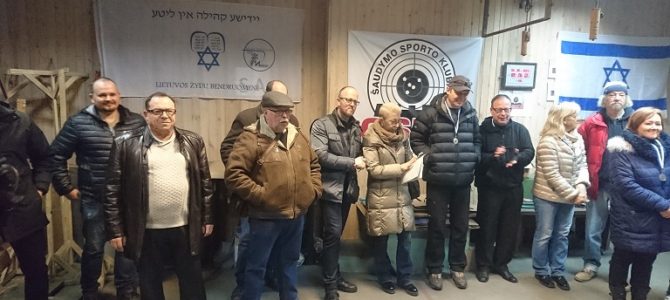
Makabi Shooting Competition Dedicated to Lithuanian Volunteer Soldier Volf Kagan
The target-shooting competition the Makabi athletics club held in Vilnius this week was dedicated to Lithuanian volunteer soldier and two-time recipient of the Order of the Cross of Vytis Volf Kagan.
Men, women, young people and old hands turned out for the Makabi competition at the GSKA firing range in Vilnius November 25. The assignment was a difficult one: each competitor got 15 pistol shots (five practice shots and ten which counted) to hit a paper target 20 meters away. Shooters from Šiauliai, Trakai and Šalčininkai competed for the first time. Several married couples and father-and-son teams made it a family affair.
The Fish family dominated in three categories. The brothers Fish, Adomas and Nojus, took first and second place in the youth competition with 50 and 43 points, respectively. Nikolas Vasjanovas took third. In the women’s group their mother Kristina scored highest at 81 points, overtaking Valentina Finkelšteinienė at 78 and Greta Sinkevičiūtė with 57 points. The best marksmen in the men’s group was Julius Janavičius (97 points) followed by Julijus Fišas aka Fish (94 points) with Daniel Lupšic in third place with 92 points. In the veterans’ group Julijus Fišas remained undefeated with 94, Arkadijus Goldinas took second with 92 points and Ivanas Miškinis followed closely with 91 points.
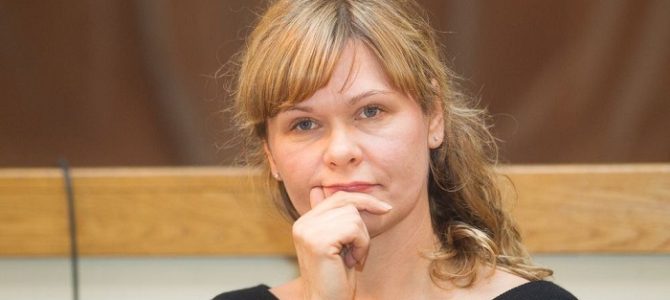
Opening of Exhibit “Mission: Lithuanian Citizens. Siberia”
The Lithuanian Jewish Community invites you to come to a meeting/lecture/discussion/exhibit opening at 6:00 P.M. on December 4. The LJC is located at Pylimo street no. 4 in Vilnius. The “Mission: Lithuanian Citizens. Siberia” event is dedicated to discussing the deportations from Lithuania in June of 1941. The official telling of the story of the deportations often seems to exclude the multi-ethnic nature of the deportees and their diversity of views and beliefs. They were only united in the fact the occupational regime which swept into power didn’t approve of them.
Dr. Violeta Davoliūtė will give a presentation based on her research. LJC board member Daumantas Todesas, Vilnius Jewish Public Library director Žilvinas Beliauskas and Lithuanian Department of Ethnic Minorities director Dr. Vida Montvydaitė will also speak on the topic of the event.
An exhibit of photographs will officially open at the same time.
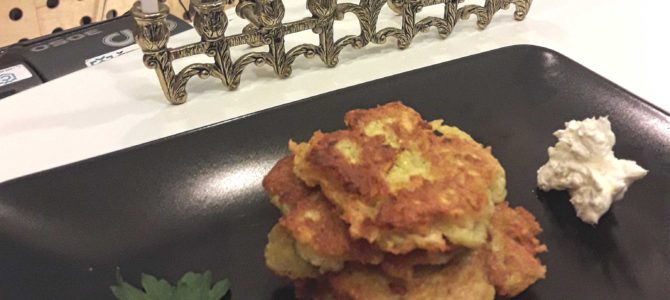
Latkes: Traditional Hanukkah Food
Latkes are potato pancakes which Jews consider a national dish, as do Lithuanians, Russians, Belarusians, Ukrainians, Germans, Czechs and the Swiss. The first mention of the potato dish seems to come from 1830 and seems to have been German cuisine. although the word itself comes into Yiddish probably from Russian. Whatever the case, Jews made latkes global and it is a required part of the Hanukkah table now.
Some sources say latkes were originally made of buckwheat. Others put their origins in Italy where pancakes were served with ricotta cheese. Rabbi Kalonymus ben Kalonymus (1286-1328) seems to be the first person to associate pancakes with Hanukkah, in a poem about the holiday.
When Spain expelled the Jews of Sicily in 1492, they took their ricotta cheese pancakes with them and introduced them to the Jews in the northern Italian lands. These pancakes reportedly were called cassola in Rome.
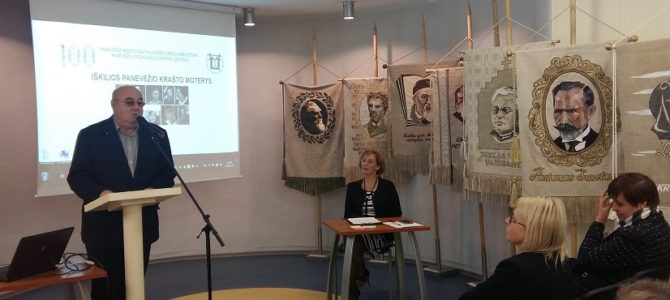
Conference “Remarkable Women of the Panevėžys Region”
Acting Panevėžys mayor Petras Luomanas welcomed speakers and audience to the conference, saying: “It is very significant that we are now for the second time holding a conference in which we remember the remarkable women of our region whose contributions to culture, education, health-care, industry and other areas of endeavor in Panevėžys and throughout Lithuania have been gigantic.” Library director Loreta Breskienė spoke her library’s activities and “Lithuania’s Greats,” an exhibit of hand-sewn flags there. The author of the exhibit is Sofija Kanaverskytė, an artist and former resident of Panevėžys who did scenography at the J. Miltinis Drama Theater there.
The main topic of Panevėžys Jewish Community chairman Gennady Kofman’s presentation was historical information about the activities of notable Jewish women of Panevėžys till 1940. He said many of the Jewish women are little-known, including sculptress Marija Dilon, the businesswomen Ana Kisina and Lėja Chazanienė, social activist and doctor Ana Merienė, Panevėžys Jewish Hospital doctors Mirijam Todesaitė-Blatienė and Zinaida Kukliansky and the dentists Vera Dembienė, Golda Izraelienė, Liuba Gurevičienė and Chasjė Feigelienė. Much more widely known was the Jewish women’s Esperanto organization in the city of Panevėžys, whose members included Ana Grinberg, daughter of Rabbi Abraham Grinberg.
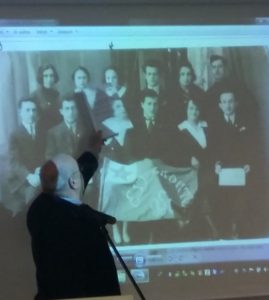
Kofman said the topic of notable Jewish women has been neglected in Panevėžys as it has throughout Lithuania. Many write about men and their contributions, while women remain on the margins. He said this conference was a very good idea and should serve to foster a more tolerant attitude towards life and history.
Conference participants included deputy director of the Panevėžys city administration for educational affairs Sandra Jakštienė, Panevėžys Regional History Museum director Arūnas Astramskis, principals and teachers of the gymnasia in Panevėžys and other professionals working in education in the city. Nine presentations were given, including by Panevėžys College library director Vilija Raubienė, Panevėžys District G. Petkevičaitė-Bitė Public Library librarian Albina Saladūnaitė, regional history expert from Šiauliai Irena Dambrauskaitė-Rudzinskienė, director of the Kalba Knyga Kūryba Communications Center Lionė Lapinskienė, museum specialist Donatas Juzėnas, Paįstrys resident and local history expert Stasė Mikeliūnienė and puppeteer Antanas Markuckis.
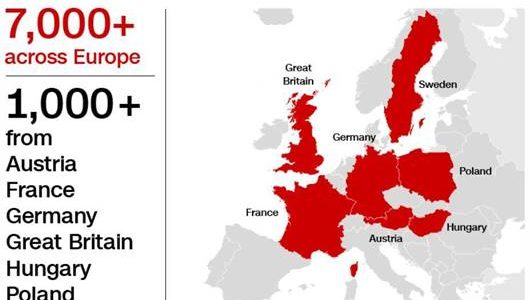
A Shadow over Europe: CNN Poll Reveals Depth of Anti-Semitism in Europe

European Jewish Congress
Dear Presidents,
Dear Friends,
We would like to draw your attention on the findings of the CNN Poll on Antisemitism in Europe.
Please find below some of the most appalling results:
–According to the poll, more than a quarter of Europeans surveyed believe Jews have too much influence in business and finance. Nearly one in four said Jews have too much influence in conflict and wars across the world.
–One in five said they have too much influence in the media and the same number believe they have too much influence in politics.
–A third of Europeans polled said they knew just a little or nothing at all about the Holocaust.
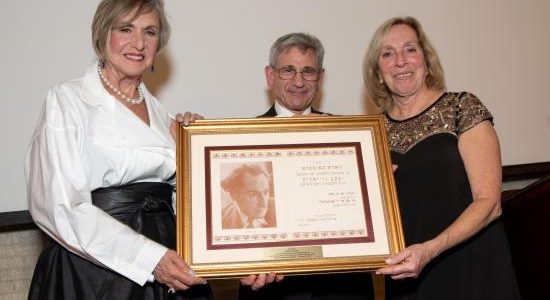
Irene Pletka Donates Million Dollars for YIVO Bund Collection Digitization
YIVO in New York has had a separate collection for the Jewish Bund since 1992. Recently they announced a project to digitize that collection to make it accessible to scholars and the public around the world. Vice-chairwoman of the YIVO board Irene Pletka initiated the project and announced she is donating one million dollars to the effort.
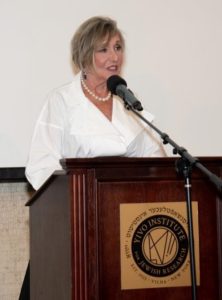
More than 150 people came to the YIVO gallery in New York to honor Pletka for her exemplary donation, inspirational generosity and extraordinary sense of duty in preserving Jewish history and culture. After the Bund project receives donations totaling from 2.5 to 3 million dollars the first phase of digitization will begin.
The Bund Jewish political party began in Vilnius in 1897 with a socialist democrat platform and pledge to fight pogroms. YIVO describes the part as a Jewish political party adhering to a social democrat ideology in the context of Jewish culture and seeking Jewish political autonomy. Political science professor Jack Jacobs at Cambridge University in New York says the Bund was the first Jewish political party in Eastern Europe. Bund ideology was aimed at the Jewish working class.
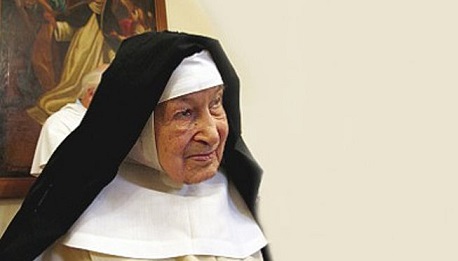
Nun Who Helped Abba Kovner Dies at 110
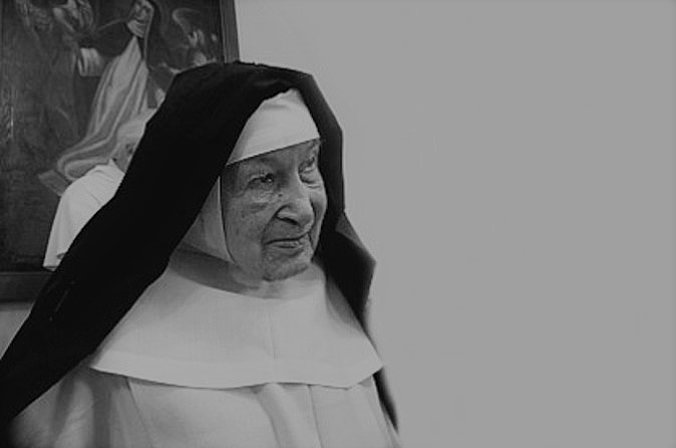
Sister Cecylia Maria Roszak passed away at a convent in Cracow on November 16 at the age of 110, the archdiocese of Cracow reported. She was probably the oldest Catholic nun in the world at the time of her death. She was also a Righteous Gentile who harbored Jews in Nazi-occupied Vilnius, including writer and partisan leader Abba Kovner.
Maria Roszak was born March 25, 1908, in Kiełczewo and joined the Dominican order at the Gródek monastery (named after an old fortification and now neighborhood, adjacent to the Church of Our Lady of the Snows) in Cracow at the age of 21. In 1938 she and several fellow nuns were sent to Vilnius, then Wilno under Polish control, or more precisely to Naujoji Vilna outside the city, where the order had a wooden house and chapel on five hectares of land and intended to set up a monastery under Anna Borkowska, aka Mother Bertranda. World War II cut short these plans.
Vilnius came under Soviet occupation and then Nazi occupation. During the Nazi occupation Roszak and fellow nuns under Mother Bertranda hid 17 members of the Jewish resistance at their convent, including future ghetto underground leader, partisan and writer Abba Kovner.
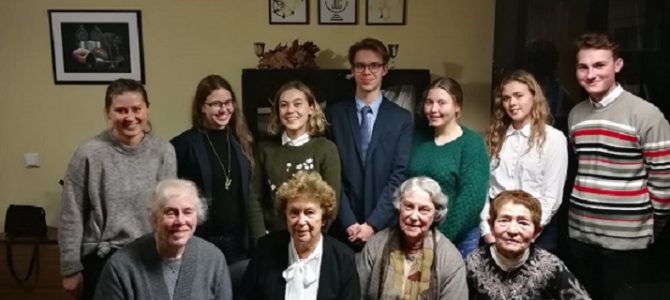
Kaunas Jewish Community Meets Students
Kaunas as the cultural capital of Europe for 2022 is preparing an educational program for high school students aged 15 to 18 called “The Challenge of Kaunas.”
The Bureau of Memory program is striving to interest high school students in the multi-ethnic and multicultural history of Kaunas. The students have an assignment: to draft a project for the younger and older generation, including KJC senior citizens, to work together. The students are being encouraged to learn about the city’s history from living eye-witnesses and to come up with proposals for what they themselves have to offer the elder generation; what manner of cooperation might work is left up to them.
The students had the opportunity at the meeting at the KJC to communicate directly with members of the Community and to learn about their biographies. The young participants reported that they were very interested and moved by the warmth of Community members.
The KJC said this meeting was the start of a new and beautiful friendship.
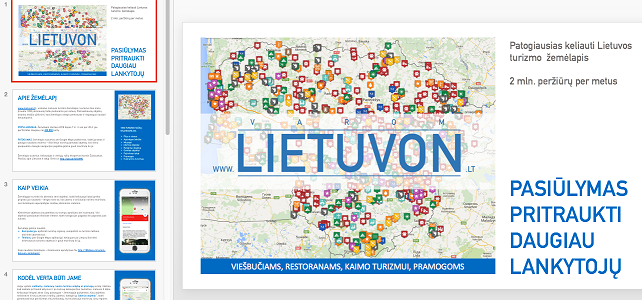
Visit the Lost Shtetlakh, the Jewish Towns in Lithuania
The popular Lithuanian travel page www.lietuvon.lt has been updated and now includes a new group of sites, the shtetlakh, towns which had a large Jewish population before the Holocaust.
The Lithuanian-language internet site is promising to continuously update local and regional Jewish heritage tourist routes (at https://www.lietuvon.lt/stetlai) which are being developed and advertised by local municipalities. tourism information centers, museums, libraries and individual travel enthusiasts.
This project is the fruit of a joint-venture between the Lithuanian Jewish Community and www.lietuvon.lt author Karolis Žukauskas.
The project receives support from the Lithuanian Cultural Heritage Department and the Goodwill Foundation.
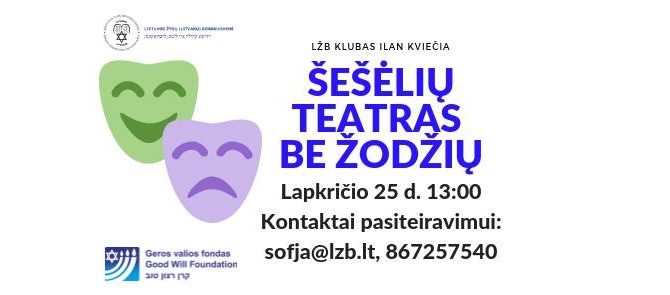
Wordless Shadow Theater
The Ilan Club invites members and interested parties to attend a workshop on shadow theater at 1:00 P.M. on November 25. Those interested should send an email to sofja@lzb.lt or call 867257540.
The goal of the workshop is to create a short play based on traditional Jewish tales. The play will be expressed in light and shadow and without words. The director believes the lack of verbal content will enhance perception of the environment and people around us, thus increasing empathy and fostering new kinds of creativity. Participants at the workshop will discuss the play and will make scenography and shadow puppets with help from artists. Together with the director and actors, participants will explore different ways for characters to express themselves without using words.
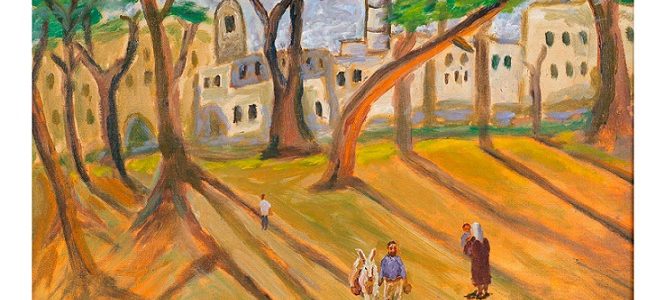
Simon Karczmar Exhibit at Vilna Gaon Museum
The Tolerance Center of the Vilna Gaon State Jewish Museum at Naugarduko street no. 10/2 in Vilnius will open an exhibit of paintings and prints by Simon Karczmar at 5:30 P.M. on November 22. The exhibit will run till January 21, 2019.
Karczmar was born in 1903 and died in 1982. His most productive period came later in life. He studied art in Paris as a young man but worked in the fur industry rather than as a professional artist. At the age of 57 he developed an allergy to fur and his wife encouraged him to return to making art. As a member of an artists’ colony in Safed, Israel, to which he moved in 1962, Karzcmar painted daily life in the Dieveniškės (Diveishok, Jevenishok) shtetl. His work has been exhibited in the USA, Canada, Israel and Mexico but never before in Lithuania. A month ago the School of Business and Technology in Dieveniškės hosted the exhibit. Karczmar’s son Natan came from Israel to attend and said the exhibit in Vilnius fulfills an old family dream.
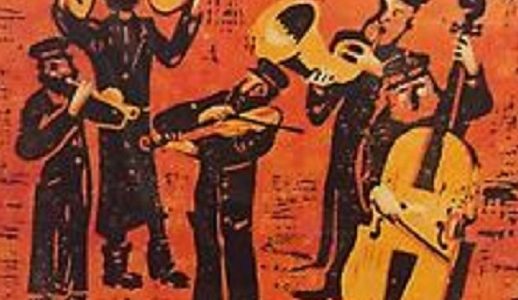
Exhibit: Simon Karczmar: From Juvenishki to Safed
Dear friends of the Vilna Gaon State Jewish Museum in Vilnius,
We kindly invite you to the opening of the exhibition “Simon Karczmar: from Juvenishki to Safed” on November 22 at 17:30 in the museum’s Tolerance Center (Naugarduko street no. 10/2, Vilnius).
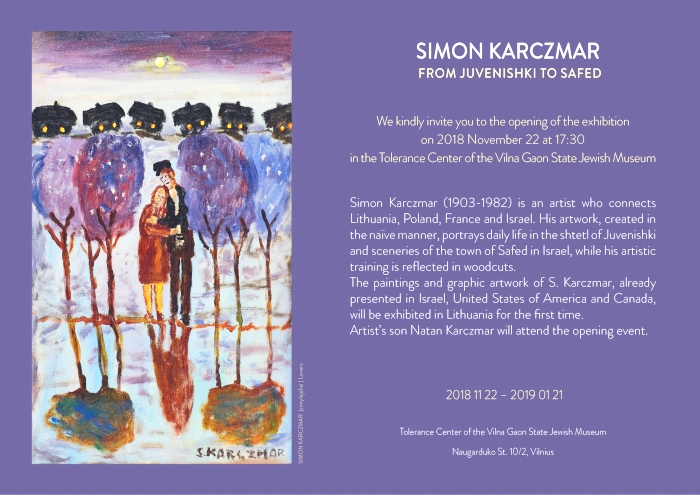
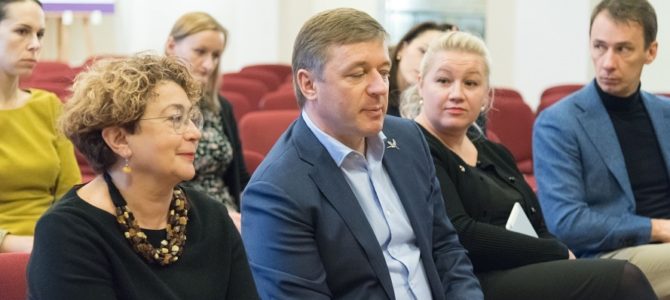
Parliamentary Cultural Committee Considers Jewish Heritage Issues
A sitting of the Lithuanian parliament’s Cultural Committee November 14 addressed Litvak heritage. The meeting was held at the Tolerance Center of the Vilna Gaon State Jewish Musum in Vilnius with committee chairman Ramūnas Karbauskis attending.
Three main issues were discussed:
1. Further expansion and financing of the Vilna Gaon Museum
2. Jewish heritage issues
3. Restoration of the Great Synagogue in Vilnius
MP Emanuelis Zingeris proposed a resolution for the restoration of the Great Synagogue at the meeting. The Lithuanian Jewish Community expressed a different position. LJC chairwoman Faina Kukliansky said Lithuanian Jews are not asking and never had asked for the rebuilding of the Great Synagogue using state funds. She further noted that currently the LJC is engaged in studying other methods and problems in commemoration and preservation, having been tasked with drafting a study on Jewish heritage by the Lithuanian Government.
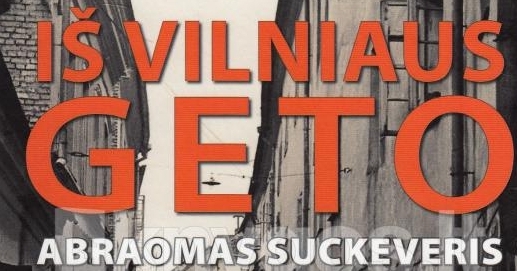
From the Vilnius Ghetto: Sutzkever’s Memoirs in Lithuanian
by Danielė Ūselytė
Abraham Sutzkever (1913-2010) was one of the most remarkable Yiddish poets in the 20th century, a Holocaust survivor, one of the leaders of the cultural resistance and in his memoirs “From the Vilnius Ghetto” provides a testimony of his authentic experience.
These texts were written immediately following the tragic events of World War II and were published in Moscow in 1946. These memoirs contain the living memories in the author’s mind and thus are a testimony of history. Feelings and states of mind are presented, indirectly, through specific situations, sometimes with irony, feelings of hopelessness, fear, debasement, but always the infinite desire to survive, to fight to the last breath. Resistance is supported by intense creativity in an extreme situation, in the belief its power will fortify human existence, and the historical narrative is based on this, demonstrating the possibility to write poetry in the tragic moment.
Full text in Lithuanian here.
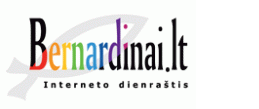
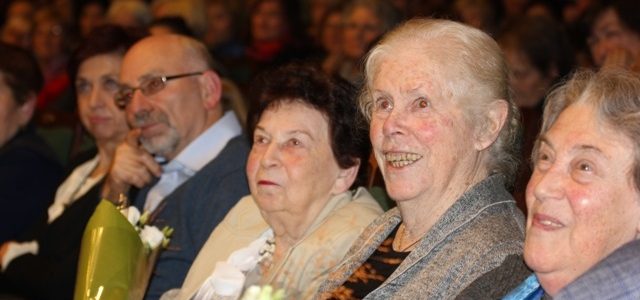
Kaunas Jewish Community News for October
In October the Kaunas Jewish Community experienced moments of celebration and painful losses, and commemorated the past.
The most momentous event in October was the celebration of the Community’s 30th birthday with a concert. The Kaunas State Philharmonic hosted the Klaipėda Chamber Orchestra accompanied by harpist Gabrielė Ašmontaitė, baritone Stein Skjervold and VilhelmasČepinskis on violin. Orchestra art director Mindaugas Bačkus presented a rich program of well-known and lesser-known works by Jewish and Litvak composers of different times and in different genres. He both played cello and presented the event.
The historian Linas Venclauskas told the audience about the history of the Jewish community and current events. He spoke about the Litvak contribution to Lithuania and together with KJC chairman Gercas Žakas presented thank-you letters from the Kaunas mayor and municipal culture department to long-standing and outstanding members of the Community, including Fruma Kučinskienė, Judita Mackevičienė, Motelius Rozenbergas, Basia Šragiene, Julijana Zarchi, Simonas Dovidavičius and Gercas Žakas himself.

